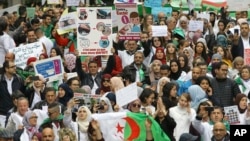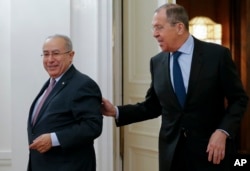Algeria's new Deputy Prime Minister Ramtane Lamamra says that President Abdel Aziz Bouteflika has vowed to hand over power to whoever is elected to succeed him, following a planned national dialogue conference under the auspices of former U.N. envoy Lakhdar Brahimi. Lamamra said a new constitution and other changes to the current regime will be enacted, followed by elections, which have been postponed until next year.
Doctors and students protested Tuesday against the government of ailing incumbent President Bouteflika in the Algerian capital Algiers and a number of other cities and towns. Various labor groups, including medical professionals and students, are calling for the president to step down next month when his term officially ends.
Tens of thousands of protesters have gathered in the capital Algiers and other parts of Algeria for the past four Fridays to call for Bouteflika to step down and to enact fundamental political reform.
Deputy Prime Minister Lamamra during a visit to Moscow Tuesday told journalists that the current crisis in his country is a "family affair," and that the government is ready to make changes to the current regime within the framework of a "national dialogue conference."
Speaking at a press conference after meeting with Russian Foreign Minister Sergey Lavrov, he said that current political, social and economic conditions have pushed many people to demand serious change to the current system of government and the government has responded by asking opposing political forces to participate in a national dialogue conference which will create a new regime by consensus [of all parties]."
Lavrov for his part insisted that the "Algerian people must determine their own destiny, and that outside parties must not interfere in the political process." Lavrov went on to condemn the "Arab Spring" revolutions which took place in a number of countries, including Libya, Syria and Tunisia, blaming "outside intervention."
Algeria's new prime minister, Noureddin Badawi, has yet to name the members of his government, despite promises to do so early this week. Various political figures and trade union leaders have called on the government to step aside and for Bouteflika to step down. Neither appear ready to do so.
Algerian Army Chief of Staff Ahmed Qaid Salah, who is a main power-broker inside the regime, in a speech to military personnel Monday, insisted the army would not stand back and watch if the situation began to deteriorate.
He said that no matter how much the situation has deteriorated, there is no problem without a solution, and we fervently pray that everyone will behave responsibly in order to find that solution as quickly as possible.
Saudi-owned Al Arabiya TV reported that former prime minister Ahmed Ouyahia called on the government to "respond to the demands of the people." He also called on his own political party and supporters to "try and convince the people of the sincerity of the government's response to popular demands."
Nurses and other professionals are calling for more protests Wednesday, while broader rallies are expected Friday.





